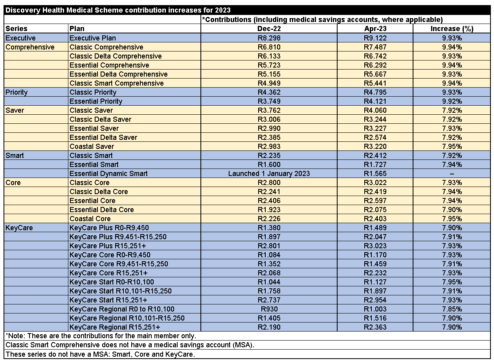Discovery Health Medical Scheme (DHMS), the largest medical scheme in South Africa, this week announced its contribution increases for 2023.
DHMS said it used its strong reserves to delay the annual contribution increases until 1 April, which means members will pay 2022 rates for the first three months of the year.
This is the third year in a row that the DHMS has deferred its contribution increases.
The contributions on its top-end plans – Executive, Comprehensive and Priority – will increase by 9.9% from 1 April. Contributions on the hospital and limited day-to-day plans – Saver, Smart, Core and KeyCare – will increase by 7.9%.
According to Discovery Health chief executive Dr Ryan Noach, 85% of DHMS members will experience a 7.9% increase in their contributions, while the remaining 15% will experience a 9.9% contribution increase.
“This represents a highly competitive weighted average increase in contributions of 8.2% for 2023, whilst sustaining contributions in line with medical inflation in DHMS,” he said.
“The differentiated increase across plans takes into account the higher disease burden on the Priority, Comprehensive and Executive plans, reflected through higher hospital admissions, oncology claims and chronic illness costs. The increases on these plans allow the scheme to maintain the industry-leading value of the benefits at contributions that are, on average, 19.8% below industry contributions for equivalent benefits,” Noach said.
Discovery said the three-month deferral of the 2023 contribution increases means that, in comparison to the contributions paid in December 2022, the average contribution paid by a member in 2023 will effectively increase by 5.9% for the KeyCare, Smart, Core and Saver plans, and by 7.4% for the Priority, Comprehensive and Executive plans.
Noach said the deferral of annual contribution increases for 2021, 2022 and 2023 have cumulatively reduced contributions by R8.6bn for all members over those three years. “This has limited increases for members to 1.9% above CPI over this three-year period, significantly below the prevailing medical inflation, which is 3 to 4% above CPI.”





While the cap for 2023 is 5.5%